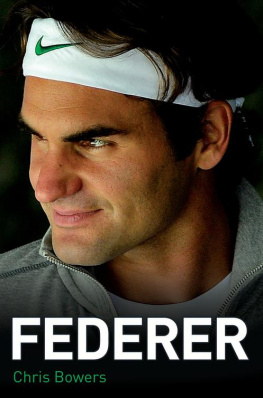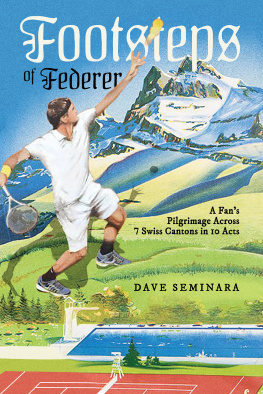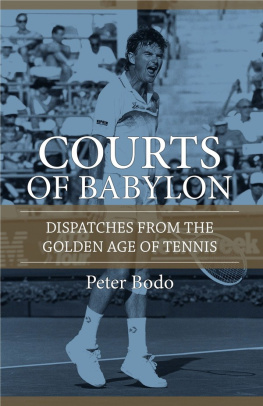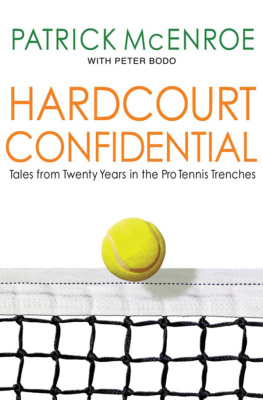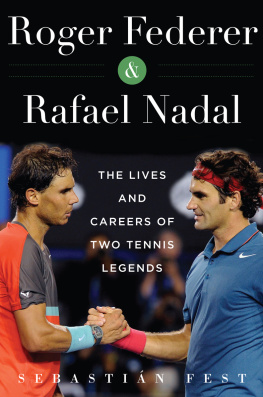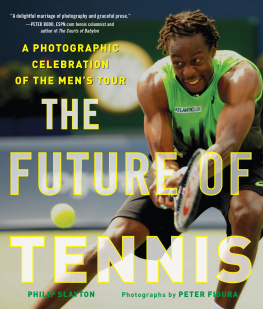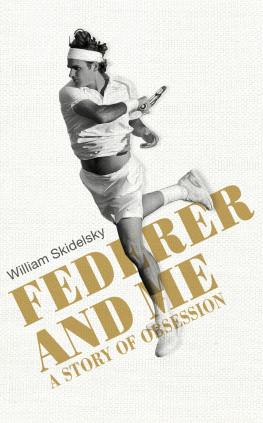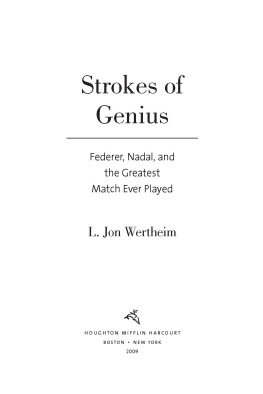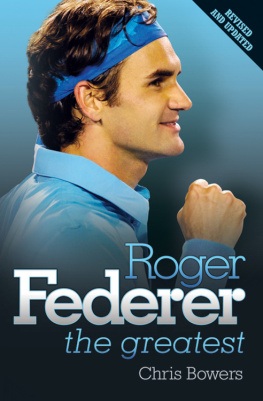He is a highly intelligent lad, who has the right feeling for the right moment, and there are very few people who in the right moment find the right thing to do. He is one of them. Hes no academic, but his word is bond, a deal is a deal.
ROGER BRENNWALD, SWISS TENNIS IMPRESARIO
I heard something on television about two weeks ago saying Tiger Woods is going to pass Michael Jordan as the best athlete of our time. I think thats a joke. Id make a case for Roger Federer being the best athlete of our time. Not tennis player, athlete. No offence to Tiger, hes an incredible golfer, but his record in matchplay events, the events where youre out if you have a bad day, isnt particularly impressive. We tennis players have that every single week. Roger wins every Grand Slam title except the French Open, and he wins every Masters Series tournament. That means he cant allow himself a single bad day. Thats incredible.
JAMES BLAKE, AMERICAN TENNIS PLAYER (US OPEN, 2006)
I was out there with the best player I ever saw Roger.
RAFAEL NADAL, SPANISH TENNIS PLAYER (AUSTRALIAN OPEN, 2009)
You are the most popular tennis player in China because you have a nice smile and a big nose.
A CHINESE JOURNALIST PREFACING A QUESTION TO FEDERER AT THE 2002 TENNIS MASTERS CUP IN SHANGHAI
Who plays tennis on a ship? Jolly Roger Federer.
A JOKE COMPILED BY THE AUTHORS SIX-YEAR-OLD DAUGHTER
CONTENTS
N OTE
Much reference is made in this book to Masters and Masters Series tournaments, the group of nine elite tour events that form the biggest mens tournaments below the four Grand Slams. In 2009, the ATP officially changed the name of these events to 1000 tournaments, a name based on the amount of ranking points the winner receives. But because the nine were branded moderately successfully over the preceding decade as the Masters Series, the name Masters has stuck, with the term Masters-1000 evolving as a halfway house between the common and the official names. This book sticks largely to Masters Series, with occasional references to Masters and Masters-1000.
W ho is the greatest? Its a question asked by children in the school playground, by people discussing legends over a drink in the bar, by journalists trying to assess the relative merits of a body of work, and by countless others. They all want to know who the greatest in a certain discipline is.
The question is asked slightly differently in this book. Since winning the French Open and Wimbledon in 2009, the tennis world is pretty much united in its recognition of Roger Federer as the greatest tennis player of all time. But who is he? Where does he come from? How has his route to greatness shaped him? And what lessons from the Federer legend are there for others to learn, especially parents who may have equally gifted offspring and arent sure entirely how to help them?
This book is both a work in its own right and a development of three earlier books. In 2005-06, I wrote Fantastic Federer, which was updated in 2007. At that time, Federer was still in his mid-twenties, so the book was very much a profile of him and a speculation of what he might go on to achieve. As his greatness came more to the fore, a third book appeared in 2009, Roger Federer Spirit of a Champion. But what Federer achieved in the six weeks in the middle of 2009 marks a watershed between the part of his career characterised by potential, and the period in which he has been truly acknowledged as the greatest in his discipline. The Roger Federer story is by no means finished, as he continues to play on the tour and is still among the frontline favourites for every tournament he enters. But the time has now been reached where the body of work that is his career can be seen in some context, superseding the years when we had to wait to see what else he would achieve before we could safely assess his legend.
This book builds on the three earlier books. His childhood and early career have not changed since 2006, but the way we view him as a person and a champion has. And some events that seemed quite important a few years ago have been eclipsed by bigger achievements since then. As such, readers who come to this book without having read the other three will be as at home with this biography of Roger Federer as those who have read every word of the others.
Yet however comprehensive this book tries to be, it is only part of the Federer story. When the man himself comes to write his own autobiography or authorised biography there will be more meat on the bones. In many ways it is odd that he has not yet published a work about his life. Most sports stars have published at least one autobiography by the time they approach their thirtieth birthday, in some cases more. Inevitably, some of these works are more enlightening than others those that offer information about what makes a person tick are invariably more interesting than those which serve little more of a purpose than commercial aggrandisement.
But Roger Federer is different. Since he won his first Wimbledon title in July 2003, he and his advisers have been inundated with requests from publishers and journalists for him to write his autobiography, or to cooperate on an authorised biography. He has always turned such requests down. The reason he gives is that he doesnt yet want to invest the time necessary to do a proper job on his own story. While that reason rings true, he is also known to be keeping a diary of his own thoughts and reflections so that one day probably when his playing career is over or drawing to a close he will be able to write his own account of his career. Until then, he is very relaxed about others writing about him, as long as no book claims to be in any way authorised.
This book is therefore an unauthorised biography, although I prefer the word independent as unauthorised is often taken to mean inherently hostile. The lack of authorisation gave me a degree of freedom to write about Federer without constraints about what he or his advisers might have wanted me to write. I was able to speak freely with many of the people who have helped to shape him, and paint a picture of him both as a person and a tennis player. The picture that emerges is still one of a thoroughly decent bloke, albeit one whose naturally amenable character has come under increased bombardment from a cocktail of fawning and financial inducements that would test the moral fibre of a saint.
Yet even when Federer comes to write his own book and reveal more of what went on in his mind and in Team Federer during his time at the top, it will not be the definitive work on its own. Federers career is made up as much of the impact it has had on others and the way his personality has evolved through his various successes and setbacks, as it is through the mans own thought processes and recollections. As such, the tales and memories of those who have shaped him and travelled the journey with him are also a valid part of the story. As with Fantastic Federer and Spirit of a Champion, this book pulls together my own research and draws on published material in English, German and French.
I am fortunate to be in a pretty much ideal situation to write about Roger. Ive known him since he was sixteen I first interviewed him after hed won the boys singles at Wimbledon in 1998 and the fact that I have lived in Switzerland, speak German and French (even the Swiss German dialects that baffle many citizens of Germany), and know several people with whom he grew up puts me in a unique position among international tennis writers to write his biography.
Obviously, Im indebted to a number of people who have borne witness to Rogers development and have given me the benefit of their experience, including (in alphabetical order): Yves Allegro, Madeleine Brlocher, Roger Brennwald, Darren Cahill, Beat Caspar, Marco Chiudinelli, Ashley Fisher, Roger Jaunin, Seppli Kacovski, Marco Mordasini, Francesco Ricci Bitti, Niki von Vary, Freddy Widmer and Thomas Wirz. I am also grateful, for various bits of important help, to: Faye Andrews, Nicola Arzani, Tim Curry, Richard Eaton, Tony Godsick, Mark Hodgkinson, Frank Hofen, Mitzi Ingram Evans, Annie Hammerton, Severin Lthi, Ian McDermott, Konrad Meyer, Peter Miles, Jack Milner, Helen Mittwoch, Daniel Monnin, Claudia Moser, Andrew Rigby, Neil Robinson, Barbara Travers, Jrg Vogel and Paul Zimmer. Id also like to thank Lynette Federer and Tony Godsick for their help in discussing the original concept and for their willingness to help subsequently within the constraints set by Roger.

